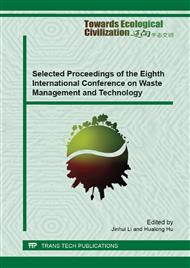[1]
H.T. Wang, Y.F. Nie, Municipal solid waste characteristics and management in China. Journal of the Air and Waste Management Association. 51(2001) 250–263.
DOI: 10.1080/10473289.2001.10464266
Google Scholar
[2]
A.J. Morrissey, J. Browne, Waste management models and their application to sustainable waste management. Waste Management. 24 (2004). 297-308.
DOI: 10.1016/j.wasman.2003.09.005
Google Scholar
[3]
Y. Jiang, M.Y. Kang, Z. Liu, Y.F. Zhou, Urban garbage disposal and management in China. Journal of Environmental Sciences. 15(2003) 531-540.
Google Scholar
[4]
X. Chen, Y. Geng, T. Fujita, An overview of municipal solid waste management in China. Waste Management. 30(2010) 716-724.
DOI: 10.1016/j.wasman.2009.10.011
Google Scholar
[5]
D. Zhang, T.S. Keat, R.M. Gersberg, A comparison of municipal solid waste management in Berlin and Singapore. Waste Management. 30(2010) 921-933.
DOI: 10.1016/j.wasman.2009.11.017
Google Scholar
[6]
Information on http: /www. gov. cn/ziliao/flfg/2007-06/05/content_636413. htm.
Google Scholar
[7]
Information on http: /www. gov. cn/zwgk/2005-09/08/content_30305. htm.
Google Scholar
[8]
Information on http: /www. gov. cn/flfg/2007-03/30/content_566242. htm.
Google Scholar
[9]
NBS, MOEP, China Statistics Yearbook on Environment 2008 [in Chinese]. China Statistics Press, Beijing, China. (2008).
Google Scholar
[10]
NBS, MOEP, China Statistics Yearbook on Environment 2009 [in Chinese]. China Statistics Press, Beijing, China. (2009).
Google Scholar
[11]
NBS, MOEP, China Statistics Yearbook on Environment 2010 [in Chinese]. China Statistics Press, Beijing, China. (2010).
Google Scholar
[12]
NBS, MOEP, China Statistics Yearbook on Environment 2011 [in Chinese]. China Statistics Press, Beijing, China. (2011).
Google Scholar
[13]
NBS, MOEP, China Statistics Yearbook on Environment 2012 [in Chinese]. China Statistics Press, Beijing, China. (2012).
Google Scholar
[14]
Information on http: /www. hzepb. gov. cn/zwxx/ghjh/hjgb/201206/t20120604_15344. htm.
Google Scholar
[15]
Information on http: /www. hzepb. gov. cn/zwxx/kjjc/hjgb/201306/t20130604_21181. htm.
Google Scholar
[16]
D.Q. Zhang, S.K. Tan, R.M. Gersberg, Municipal solid waste management in China: Status, problems and challenges. Journal of Environmental Management. 91(2010) 1623-1633.
DOI: 10.1016/j.jenvman.2010.03.012
Google Scholar
[17]
Y. Zhao, H.T. Wang, W.J. Lu, A. Damgaard, T.H. Christensen, Life-cycle assessment of the municipal solid waste management system in Hangzhou, China. Waste Management & Research, 27 (2009) 299-406.
DOI: 10.1177/0734242x09103823
Google Scholar
[18]
A.K. Bernstad, J. l.C. Jansen, H. Aspegren, Life cycle assessment of a household solid waste source separation programme: a Swedish case study. Waste Management & Research. 29 (2011) 1027-1042.
DOI: 10.1177/0734242x11406170
Google Scholar
[19]
Information on http: /www. hangzhou. gov. cn/main/wjgg/zxwj/zfwj/cscg/csgl/T369050. shtml.
Google Scholar
[20]
Information on http: /www. chinanews. com/sh/2011/06-07/3094984. shtml.
Google Scholar
[21]
J.Q. Li, D. Borenstein, P.B. Mirchandani, Truck schedule recovery for solid waste collection in Porto Alegre, Brazil. International Transactions in Operational Research. 5 (2008) 565-582.
DOI: 10.1111/j.1475-3995.2008.00648.x
Google Scholar
[22]
S.S. Chung, C.W.H. Lo, Waste management in Guangdong Cities: The waste management literacy and waste reduction preferences of domestic waste generators. Environmental Management. 33 (2004) 692-711.
DOI: 10.1007/s00267-004-0020-2
Google Scholar
[23]
Information on http: /www. cn-hw. net/html/sort056/201106/27831. html.
Google Scholar
[24]
Information on http: /z. hangzhou. com. cn/0011rd32/content/2011-06/29/content_3782514. htm.
Google Scholar
[25]
I. Okuda, V.E. Thomson, Regionalization of municipal solid waste management in Japan: balancing the proximity principle with economic efficiency. Environmental Management. 40 (2007) 12-19.
DOI: 10.1007/s00267-006-0194-x
Google Scholar


